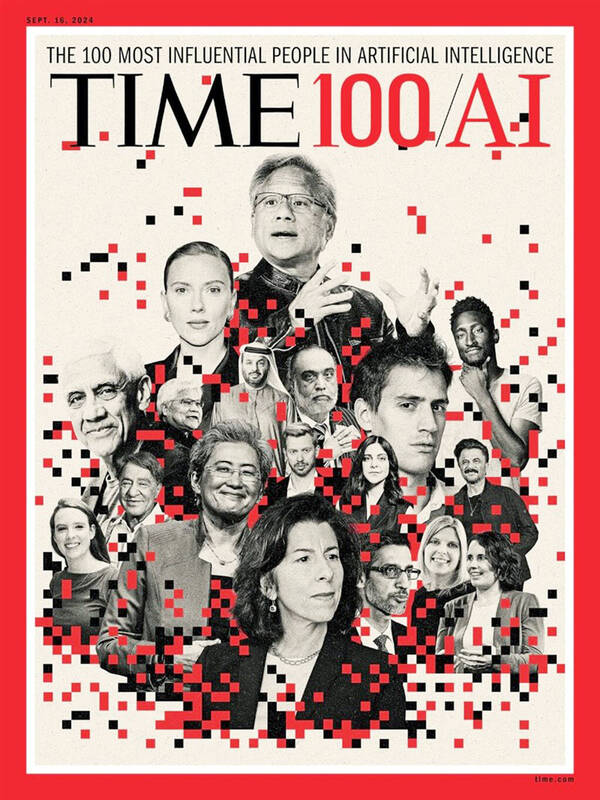Time magazine on Thursday announced its list of the 100 most influential people in artificial intelligence (AI), which included Taiwan Semiconductor Manufacturing Co (TSMC) chairman and chief executive officer C.C. Wei (魏哲家), Nvidia CEO Jensen Huang (黃仁勳) and AMD chair and CEO Lisa Su (蘇姿丰).
The list is divided into four categories: Leaders, Innovators, Shapers and Thinkers. Wei and Huang were named in the Leaders category.
Other notable figures in the Leaders category included Google CEO Sundar Pichai, Microsoft CEO Satya Nadella, OpenAI CEO Sam Altman and Meta CEO and Facebook founder Mark Zuckerberg.

Photo from the Time Facebook page
Su was listed in the Innovators category.
Time highlighted Wei’s leadership at TSMC, the world’s largest semiconductor foundry, where he has been CEO since 2018 and became chairman in June.
The report highlighted TSMC’s growing importance as AI technology develops and its role as the only company capable of producing chips needed for advanced AI systems.
TSMC’s market value has nearly tripled over the past six years.
The article also praised Wei’s careful management of public statements, especially amid escalating US-China tensions, while acknowledging his role in TSMC’s global expansion.
Under Wei’s leadership, TSMC has established operations in the US, Germany and Japan.
Huang, who also appeared on last year’s list, is a “rock star” of the tech world, often spotted in his signature leather jacket, Time said.
At Computex Taipei in June, a fan asked Huang to sign her chest, showcasing the phenomenon known as “Jensanity,” which has elevated him to celebrity CEO status.
Time recognized Su as an Innovator, commending her strategic decisionmaking in leading AMD.
Su has focused on leveraging the company’s strengths and forming key partnerships, guiding AMD through one of Silicon Valley’s most remarkable turnarounds, it said.

Temperatures in northern Taiwan are forecast to reach as high as 30°C today, as an ongoing northeasterly seasonal wind system weakens, the Central Weather Administration (CWA) said. CWA forecaster Tseng Chao-cheng (曾昭誠) said yesterday that with the seasonal wind system weakening, warmer easterly winds would boost the temperature today. Daytime temperatures in northern Taiwan and Yilan County are expected to range from 28°C to 30°C today, up about 3°C from yesterday, Tseng said. According to the CWA, temperature highs in central and southern Taiwan could stay stable. However, the weather is expected to turn cooler starting tonight as the northeasterly wind system strengthens again

The Ministry of Foreign Affairs (MOFA) yesterday expressed “grave concerns” after Singaporean Prime Minister Lawrence Wong (黃循財) reiterated the city-state’s opposition to “Taiwanese independence” during a meeting with Chinese Premier Li Qiang (李強). In Singapore on Saturday, Wong and Li discussed cross-strait developments, the Singaporean Ministry of Foreign Affairs said in a statement. “Prime Minister Wong reiterated that Singapore has a clear and consistent ‘one China’ policy and is opposed to Taiwan independence,” it said. MOFA responded that it is an objective fact and a common understanding shared by many that the Republic of China (ROC) is an independent, sovereign nation, with world-leading

COOLING OFF: Temperatures are expected to fall to lows of about 20°C on Sunday and possibly 18°C to 19°C next week, following a wave of northeasterly winds on Friday The Central Weather Administration (CWA) on Sunday forecast more rain and cooler temperatures for northern Taiwan this week, with the mercury dropping to lows of 18°C, as another wave of northeasterly winds sweeps across the country. The current northeasterly winds would continue to affect Taiwan through today, with precipitation peaking today, bringing increased rainfall to windward areas, CWA forecaster Liu Pei-teng (劉沛滕) said. The weather system would weaken slightly tomorrow before another, stronger wave arrives on Friday, lasting into next week, Liu said. From yesterday to today, northern Taiwan can expect cool, wet weather, with lows of 22°C to 23°C in most areas,

Taiwan sweltered through its hottest October on record, the Central Weather Administration (CWA) said yesterday, the latest in a string of global temperature records. The main island endured its highest average temperature since 1950, CWA forecaster Liu Pei-teng said. Temperatures the world over have soared in recent years as human-induced climate change contributes to ever more erratic weather patterns. Taiwan’s average temperature was 27.381°C as of Thursday, Liu said. Liu said the average could slip 0.1°C by the end of yesterday, but it would still be higher than the previous record of 27.009°C in 2016. "The temperature only started lowering around Oct. 18 or 19